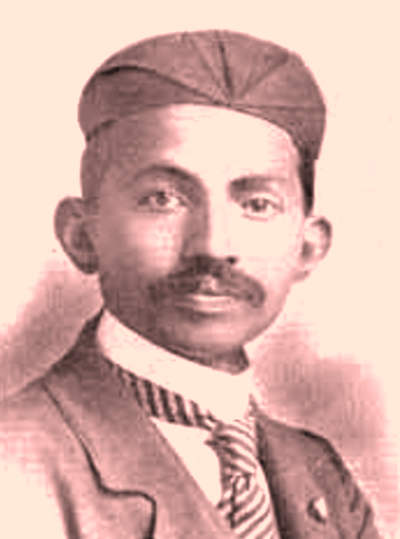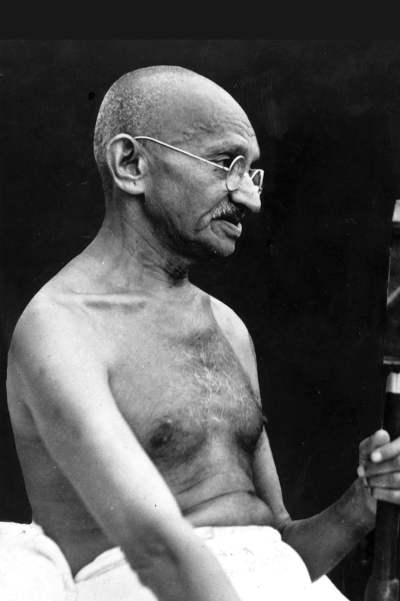 Gandhi as a
young lawyer, in 1902
Gandhi as a
young lawyer, in 1902When the epic film of Gandhi's life first came out in 1983, America’s Newsweek magazine commented: "There are very few movies that absolutely must be seen. Sir Richard Attenborough’s GANDHI is one of them." The magazine then went on to devote six full pages to the film and its background, unprecedented coverage for a film.
The film, which won no fewer than eight Oscars, traced the life of Mahatma Gandhi, who was one of the most amazing men of his age. Gandhi was assassinated in 1948, at the age of 78 — and it is with this event that the film begins. We see the bald bespectacled white-robed old man that the world recognises as Gandhi, before suddenly getting taken back to the 1890s, to South Africa, where a certain Mr. Mohandas K. Gandhi was working as a young lawyer.
M.K. Gandhi was a perfect example of a successful son of the British Empire, as it was at the time. He had been born into a well-to-do Hindu merchant family on October 2 1869 in the town of Porbander in the Indian state of Gujarat. At the age of 18, on his father's advice, he went to study law in England, returning to India three years later as a qualified lawyer.
Following his student years in London, he dressed like an educated Englishman, and behaved like one too. Back in India he was recruited by a shipping company, and in 1893 he went to work in the company's offices in Durban, South Africa.
A few weeks after reaching South Africa, he was sent by train
from
Durban to the capital city Pretoria to settle
a dispute for his client. South Africa
at the time was controlled by the Boers, Afrikaans-speaking
Whites, who
believed in racial segregation,
and it was during this trip that he first came face to face
with
the country's race laws. The young London-trained lawyer was sitting in
the first class compartment
of a train, as was
appropriate for anyone of his status, when suddenly an
angry White
told him to get back to the third class compartment where he belonged.
Gandhi's passive refusal to do so led to his being thrown off
the train.
 Gandhi in
1948
Gandhi in
1948This, according to Gandhi, was the incident which changed his life. Having experienced the way that Indians and other people of colour were discriminated against in South Africa, Gandhi decided to set up a movement to fight without violence for the rights of Indians and against injustice. From then on, the well-off young lawyer from India would use his skills to work against the racial discrimination which existed at the time in South Africa (just as it did in many other parts of the world). Having initially journeyed to South Africa for a short business mission, he ended up spending 21 years in the country, spearheading non-violent campaigns against racial segregation, injustice and discrimination. It was a hard fight, during which Gandhi was beaten up, almost assassinated, and sent to prison four times; but in the end his perseverence and popularity prevailed, and in 1914 Jan Smuts, Prime Minister of the Union of South Africa, signed the Indian Relief Act, effectively ending discrimination... for the time being.
By then, Gandhi had returned to India where he was already an almost mythical figure. In the thirty-four years which followed, Gandhi successfully led his country to Independence from British colonial rule, opposing the British with his policy of non-violent passive resistance. This was the period in his life when he was most influential. Winston Churchill – one of the other "great men" of the 20th century – could not stand Gandhi, and described him as a seditious fakir. Gandhi represented a force that Churchill could not stop. While Churchill could fight and win against tyrants on the battlefield, Gandhi opposed force with passivity, and violence with peace, and Churchill did not know how to deal with this. What could he do against a man who could lie down on the ground when confronted by police on horseback, or could lead people on a two hundred mile march, in non-violent protest against a government monopoly over salt? Churchill had no answer to this man who inspired massive demonstrations of non violent peasants against the armed power of the British Raj in India. Were he alive today, Churchill would surely not be happy to see Gandhi's statue (photo top of page) among the twelve that stand in Parliament Square, London, just 150 metres from his own.
During his lifetime, Mahatma Gandhi was an inspiration for Indians of all religions, and the man who held India together during the final years of the British Empire. Since then, his legacy - his principles of non-violence and satyagraha, meaning "pursuit of truth" - have been an inspiration for other non-violent activists worldwide, including Martin Luther King, Nelson Mandela, and even Greta Thunberg.
Notes
Gandhi, the film. The film, directed by Richard Attenborough (the older brother of the environmentalist David Attenborough) starred Ben Kingsley, whose resemblance to Gandhi was remarkable. Kingsley, who was half Indian by descent, was a stage actor with the Royal Shakespeare Company before being catapulted into the limelight with the success of his role as Gandhi
WORDS
legacy: contribution to life, example - decade: period of ten years - devote: occupy - coverage : attention from the media - bald : without hair - bespectacled : wearing glasses - lawyer: legal expert, attorney - compartment: section - well-off : rich - merchant: trader, businessman - settle: conclude, bring to an end - Afrikaans: a variety of Dutch - to spearhead: to lead - to prevail: to win, be victorious - Act: Law - could not stand: could not tolerate - seditious: revolutionary - tyrant: monster, oppressor - the British Raj - British imperial power
Copyright © Linguapress. Do not copy this document to any other website
Copying permitted for personal study, or by teachers for use with their students
You may also like. Rosa Parks - the lady who refused to get off a bus.
STUDENTS' WORKSHEET
Gandhi - his life and legacy
Text study.1. Words and endings - Interactive exercise. Complete the missing endings where necessary in these extracts from the article: take care, some endings are grammatical, others just test your spelling, your vocabulary or even your memory.
:
2. Questions from answers: an interview with Gandhi, in 1948 Interactive exercise.
Gandhi is nearing the end of his life. Imagine this interview in which he nswers some simple questions from a young journalist. Gandhi's answers are given below; what were the questions? Add at least eight words for each question.
1.
My father was a merchant, and we had a nice house.
2.
No, I studied law in London
3.
My father said that it would be the best place to study it.
4.
Not really; I'd planned to stay in India, but I get sent to South
Africa for my employer.
5.
Just a few weeks... but I stayed there for 21 years!
6.
No, and that's why I decided to stay there.
7.
Yes, I think so. In the end Mr Smuts agreed with me. Actually, we got
on quite well together.
8.
Churchill! Yes, he was a great man, but he was an imperialist who had
different values to mine. I understood him, but he never understood me!
.
3. Text contraction
Write a very brief biography of Mahatma Gandhi using between 200 and 250 words.For teachers:
Introduction: Mahatma: Mahatma was Gandhi's nickname, meaning "great soul". It was first given to him by people in South Africa.Gandhi is surely one of the half dozen or so (note the meaning of or so as an approximator) most influential people of the twentieth century.... The article mentions one other, Churchill... and maybe two other names for the list. Can you students decide on other names that could be included in the list ?
Most lists (and there are plenty online) include Einstein.. but after that there is little consensus. And what about women?Ask students to think about it, make a list, and then explain why they have chosen certain names.
Language:
There are several expressions to pay attention to in this text. In particular look at a number of expressions in paragraphs 5 and 6 - highlighted in orange in this copy. Contrast Afrikaans-speaking and London-trained; note how as functions as the subject of the clause in as was appropriate - we do not say as it was appropriate.
The expression led to his being thrown off the train could also be expressed as led to him being thrown off the train. Both structures are used in modern English. Pay attention to were discriminated against, a good example of a prepositional verb used in the passive, with a dangling preposition.
Finally, would use is a future in the past, with the sense of was going to use, rather than a past of habit in the sense of used to use.... though either could be justified.
This, according to Gandhi, was the incident which changed his life. Having experienced the way that Indians and other people of colour were discriminated against in South Africa, Gandhi decided to set up a movement to fight without violence for the rights of Indians and against injustice. From then on, the well-off young lawyer from India would use his skills to work against the racial discrimination which existed at the time in South Africa ....
© linguapress.com





 Copyright
information.
Copyright
information.